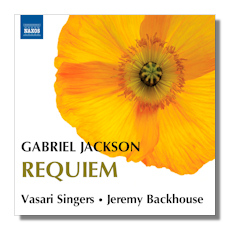
The Internet's Premier Classical Music Source
Related Links
-
Chilcott Reviews
Pott Reviews
Tavener Reviews - Latest Reviews
- More Reviews
-
By Composer
-
Collections
DVD & Blu-ray
Books
Concert Reviews
Articles/Interviews
Software
Audio
Search Amazon
Recommended Links
Site News
 CD Review
CD Review
Requiem

- Gabriel Jackson:
- Requiem (2008)
- Requiem aeternam I
- Epitaph
- Requiem aeternam II
- Autumn Wind of Eve
- Sanctus - Benedictus
- Peace, My Heart
- Lux aeterna
- In all his works (2009)
- I am the voice of the wind (2010)
- Bob Chilcott: Canon "Rosa Mystica" (2007)
(after Pachelbel - arrangement for Chorus & Guitar)* - John Tavener: Song for Athene (1993)
- Francis Pott: When David Heard That Absalom Was Slain (2008)
* Carl Herring, guitar
Vasari Singers/Jeremy Backhouse
Naxos 8.573049
Gabriel Jackson, born in Bermuda in 1962, is known largely for his choral works, though he has written a piano concerto, piano sonata and other instrumental pieces. While it is fair to cite the influence of plainchant and early liturgical styles in his choral music, one must note the multi-layered textures in Jackson's music and the many vocal effects, such as whispered and spoken parts, as well as complex rhythms. Some musicologists have suggested similarities between Jackson's style and those of Herbert Howells, Eric Whitacre and even James MacMillan, but I think most listeners would agree that Jackson has created a quite individual style that acknowledges tradition while looking forward. Thus, his Requiem, which is sung a cappella like all of his works on this disc, sounds modern but is very accessible and very lyrical in its often lush melodic flow. At times the music sounds angelic, even ecstatic, despite texts dealing with death and loss. Those texts are derived from the Latin Requiem Mass and from a diverse clutch of poets, including the Japanese Hojo Ujimasa, Bengali Rabindranath Tagore, and Americans Walt Whitman and Kevin Gilbert.
The opening Requiem aeternam I is beautiful and contains possibly the most compelling music in this thirty-six-minute work. The Sanctus and Benedictus (track 5) is a lively, colorful movement whose energetic joy is infectious. The whole work is attractive and will appeal to most listeners interested in choral music. Two more compositions on the CD by Jackson are equally compelling though much shorter: In all his works, was written for the memorial service of Canterbury Cathedral organist and choir master Allan Wicks, and I am the voice of the wind, was written in memory of Dr. Geraldine Atkinson, daughter of a member of the Vasari Singers. The former is a bit vigorous in character while the latter is gentler and sadder, even if it too sparks with energy in places.
The Chilcott arrangement of Pachelbel's Canon (set to Oscar Wilde's Requiescat from Rosa Mystica) is a lovely rendition of this familiar piece that uses accompaniment on guitar. The Tavener Song for Athene was written for actress Athene Hariades, who was killed in an accident. Sung to a drone, this seemingly dark work emerges from grayness and sadness to reach heights of heavenly beauty near the end. Francis Pott's When David Heard is a lovely though somewhat austere work of compelling character.
Founded in 1980, the Varsari Singers are regarded among the leading chamber choirs in the UK. Here, under conductor Jeremy Backhouse, they sing beautifully in all works. It would be hard to imagine a choral ensemble turning in finer renditions of this music. The Tavener and Chilcott works aside, these are world premiere recordings, and Naxos has once again produced a disc that will almost certainly garner a major award or two. The sound on this CD, by the way, is vivid. Highly recommended!
Copyright © 2012, Robert Cummings





















